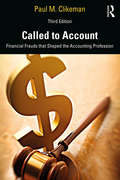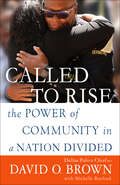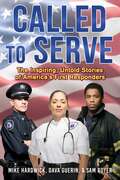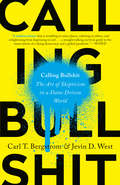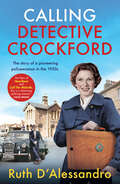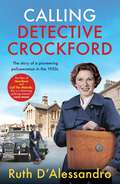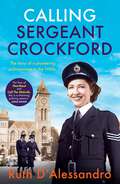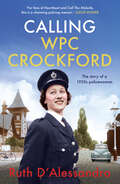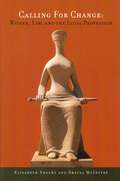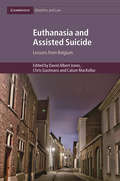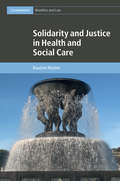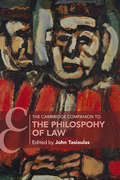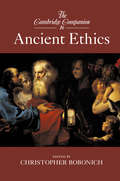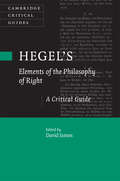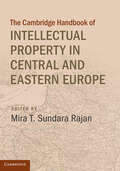- Table View
- List View
Called to Account: Financial Frauds that Shaped the Accounting Profession
by Paul M. ClikemanCalled to Account traces the evolution of the global public accounting profession through a series of scandals leading to voluntary or mandated reforms. Ever entertaining and educational, the book describes 16 of the most audacious accounting frauds of the last 80 years, and identifies the accounting standards and legislation adopted as a direct consequence of each scandal. This third edition offers expanded coverage of the Global Financial Crisis and international auditing. While retaining favorite chapters exposing the schemes of "Crazy Eddie" Antar, "Chainsaw Al" Dunlap, and Barry "the Boy Wonder" Minkow, new chapters describe the accounting problems at Lehman Brothers, Colonial Bank, and Olympus. Students will learn that financial fraud is a global problem, and that accounting reform is heavily influenced by politics. With discussion questions and a chart mapping each chapter to topics covered in popular auditing textbooks, Called to Account is the ideal companion for classes in auditing, fraud examination, advanced accounting, or professional responsibilities.
Called to Rise: A Life in Faithful Service to the Community That Made Me
by Michelle Burford David O. BrownThe Dallas police chief who inspired a nation with his response to the killing of five of his officers shares his personal story and his faith in America’s potential to unite communities through a dedication to transparency and trust. On July 7, 2016, protesters marched in the streets of Dallas to demonstrate against the killings of unarmed black men by the police. As the peaceful event drew to a close, a sniper opened fire, targeting white cops and killing five of them. Into this charged situation stepped Dallas police chief David O. Brown, who, with a historic new tactical approach, quickly ended the gunman’s siege and calmed his community and the nation. In this powerful memoir, Chief Brown takes us behind the scenes of that tragedy and shares intimate moments from his early life: his childhood, in which he was raised by a single mom in a neighborhood poor in resources but rich in love and faith; his college years—cut short when he felt called to save his hometown from its descent into drug-related violence; and, as he moved up the ranks, a series of deeply personal tragedies. His first partner on the job was killed in the line of duty; his younger brother was murdered by drug dealers; and during Brown’s first month as chief of police, his mentally ill son was killed by a cop after taking two other lives. Called to Rise charts how, over his thirty-three-year career, Brown evolved from a “throw ’em in jail and let God sort ’em out” beat cop into a passionate advocate for community-oriented law enforcement, rising from crime scene investigator to S.W.A.T. team leader to the head of a municipal police department widely regarded as one of America’s finest. Now retired, “America’s chief” wants to bring his hard-earned knowledge of Dallas—emphasizing outreach, accountability, and inclusion—to help encourage unity in the nation’s hurting communities. Chief Brown believes that we have to band together to engage in the kind of dialogue that can lead to solutions. In place of complaining, we all have to take action—and one first great step is to tune in to what is being said. Called to Rise explores the keys to that dialogue—trust, transparency, and compassion—that have made Brown a leader on the front lines of social change in America.
Called to Serve: The Inspiring, Untold Stories of America's First Responders
by Dava Guerin Mike Hardwick Sam RoyerJoin brave American men and women first responders in sixteen inspiring tales of heroism. There is no question that it has been a rough few years for America and around the world. But along with news of the COVID-19 pandemic, new variants, wildfires, etc., there also emerged stories of heroism, courage, and what it truly means to be an American.Called to Serve: The Inspiring, Untold Stories of America&’s First Responders tells sixteen stories of America&’s unsung heroes. These brave police officers, firefighters, and emergency medical professionals risk their lives every day, not knowing if it will be their last. Readers will get an inside look into their lives on and off the job, often revealing the challenges and triumphs of keeping us healthy and safe. The book takes the reader on a very personal journey of what it is like to handle life and death situations and the toll it takes on first responders. From policing drug infested neighborhoods, pulling firefighters&’ bodies from the ruble at Ground Zero and letting families cry on your shoulder after their loved one was murdered—to being an Elvis impersonator to raise money for fallen firefighters—these remarkable individuals are America&’s finest. Called to Serve will give every American a deep appreciation of what first responders&’ lives are really like, and their unwavering dedication to serve and protect every American.
Calling Bullshit: The Art of Skepticism in a Data-Driven World
by Carl T. Bergstrom Jevin D. WestBullshit isn&’t what it used to be. Now, two science professors give us the tools to dismantle misinformation and think clearly in a world of fake news and bad data. Misinformation, disinformation, and fake news abound and it&’s increasingly difficult to know what&’s true. Our media environment has become hyperpartisan. Science is conducted by press release. Startup culture elevates bullshit to high art. We are fairly well equipped to spot the sort of old-school bullshit that is based in fancy rhetoric and weasel words, but most of us don&’t feel qualified to challenge the avalanche of new-school bullshit presented in the language of math, science, or statistics. In Calling Bullshit, Professors Carl Bergstrom and Jevin West give us a set of powerful tools to cut through the most intimidating data. You don&’t need a lot of technical expertise to call out problems with data. Are the numbers or results too good or too dramatic to be true? Is the claim comparing like with like? Is it confirming your personal bias? Drawing on a deep well of expertise in statistics and computational biology, Bergstrom and West exuberantly unpack examples of selection bias and muddled data visualization, distinguish between correlation and causation, and examine the susceptibility of science to modern bullshit. We have always needed people who call bullshit when necessary, whether within a circle of friends, a community of scholars, or the citizenry of a nation. Now that bullshit has evolved, we need to relearn the art of skepticism.
Calling Detective Crockford: The story of a pioneering policewoman in the 1950s
by Ruth D'AlessandroThis nostalgic and absorbing memoir tells the story of a real-life female police detective in post-war Britain, as she navigates a man's world.It's 1956, and the Berkshire Constabulary has never had a woman detective before. That is, until bright and ambitious WPC Gwen Crockford passes out of Hendon Detective Training School with flying colours...After five years serving as one of Britain's first policewomen, Gwen Crockford becomes one of its first female detectives. Swapping crime prevention for detection, she must soon become comfortable with attending murder scenes and post-mortems, investigating sex crimes and going undercover. Her police work is diverse and challenging: dealing with Teddy boy violence, arson, a paedophile 'war hero', and solving an unexplained death are all part of her remit.Gwen is sharp and quick to learn, considered 'one of the boys' by her colleagues, DS Kinch and DS Le Mercier. Until, that is, the traumatizing death of a child, the arrival of a new sexist DS, and near-zero opportunity for promotion force Gwen to reevaluate her career.Written and researched by Gwen's daughter Ruth from family papers, remembered stories from her mother and contemporary newspapers, this is a fascinating insight into late-1950s society and the challenges faced by female police officers.This is the second book in the Crockford series, following Calling WPC Crockford – Gwen's time as a pioneering uniform policewoman in the early 1950s.
Calling Detective Crockford: The story of a pioneering policewoman in the 1950s
by Ruth D'AlessandroThis nostalgic and absorbing memoir tells the story of a real-life female police detective in post-war Britain, as she navigates a man's world.It's 1956, and the Berkshire Constabulary has never had a woman detective before. That is, until bright and ambitious WPC Gwen Crockford passes out of Hendon Detective Training School with flying colours...After five years serving as one of Britain's first policewomen, Gwen Crockford becomes one of its first female detectives. Swapping crime prevention for detection, she must soon become comfortable with attending murder scenes and post-mortems, investigating sex crimes and going undercover. Her police work is diverse and challenging: dealing with Teddy boy violence, arson, a paedophile 'war hero', and solving an unexplained death are all part of her remit.Gwen is sharp and quick to learn, considered 'one of the boys' by her colleagues, DS Kinch and DS Le Mercier. Until, that is, the traumatizing death of a child, the arrival of a new sexist DS, and near-zero opportunity for promotion force Gwen to reevaluate her career.Written and researched by Gwen's daughter Ruth from family papers, remembered stories from her mother and contemporary newspapers, this is a fascinating insight into late-1950s society and the challenges faced by female police officers.This is the second book in the Crockford series, following Calling WPC Crockford – Gwen's time as a pioneering uniform policewoman in the early 1950s.
Calling Detective Crockford: The story of a pioneering policewoman in the 1950s
by Ruth D'AlessandroThis nostalgic and absorbing memoir tells the story of a real-life female police detective in post-war Britain, as she navigates a man's world.It's 1956, and the Berkshire Constabulary has never had a woman detective before. That is, until bright and ambitious WPC Gwen Crockford passes out of Hendon Detective Training School with flying colours...After five years serving as one of Britain's first policewomen, Gwen Crockford becomes one of its first female detectives. Swapping crime prevention for detection, she must soon become comfortable with attending murder scenes and post-mortems, investigating sex crimes and going undercover. Her police work is diverse and challenging: dealing with Teddy boy violence, arson, a paedophile 'war hero', and solving an unexplained death are all part of her remit.Gwen is sharp and quick to learn, considered 'one of the boys' by her colleagues, DS Kinch and DS Le Mercier. Until, that is, the traumatizing death of a child, the arrival of a new sexist DS, and near-zero opportunity for promotion force Gwen to reevaluate her career.Written and researched by Gwen's daughter Ruth from family papers, remembered stories from her mother and contemporary newspapers, this is a fascinating insight into late-1950s society and the challenges faced by female police officers.This is the second book in the Crockford series, following Calling WPC Crockford – Gwen's time as a pioneering uniform policewoman in the early 1950s.
Calling Sergeant Crockford: The story of a pioneering policewoman in the 1960s
by Ruth D'AlessandroIt's the dawn of the Swinging Sixties. The Cold War is at its height and support for the Campaign for Nuclear Disarmament is building. The Berkshire Constabulary's Detective Gwen Crockford is promoted to Woman Police Sergeant in Newbury – the town at the heart of Britain's atomic weapons programme.Gwen's initial reservations that her posting in rural Berkshire will be boring soon prove to be unfounded. A serial sex attacker on the loose, an attempted murder at Greenham Common US Airforce Base, and a charismatic heiress with a family secret keep things interesting for the capable sergeant.Laser-focused on her police career – and resigned to the single life – Gwen is forced to re-evaluate her plans when a nature-loving war veteran PC walks into the station with an orphaned fox cub, and there's a shocking discovery in a railway station lavatory.Written by her daughter Ruth and rich in social history, this is the story of a real-life woman police sergeant at the top of her game, guiding her WPCs through the immense societal changes of the early 1960s.
Calling Sergeant Crockford: The story of a pioneering policewoman in the 1960s
by Ruth D'AlessandroIt's the dawn of the Swinging Sixties. The Cold War is at its height and support for the Campaign for Nuclear Disarmament is building. The Berkshire Constabulary's Detective Gwen Crockford is promoted to Woman Police Sergeant in Newbury – the town at the heart of Britain's atomic weapons programme.Gwen's initial reservations that her posting in rural Berkshire will be boring soon prove to be unfounded. A serial sex attacker on the loose, an attempted murder at Greenham Common US Airforce Base, and a charismatic heiress with a family secret keep things interesting for the capable sergeant.Laser-focused on her police career – and resigned to the single life – Gwen is forced to re-evaluate her plans when a nature-loving war veteran PC walks into the station with an orphaned fox cub, and there's a shocking discovery in a railway station lavatory.Written by her daughter Ruth and rich in social history, this is the story of a real-life woman police sergeant at the top of her game, guiding her WPCs through the immense societal changes of the early 1960s.
Calling WPC Crockford
by Ruth D'AlessandroIn the early 1950s, the Berkshire Constabulary finally opened its ranks to more women. And WPC Crockford was one of those early pioneers... When 21-year-old Gwendoline Crockford signed up to join the Berkshire Constabulary in 1951, she had little idea of what she was getting herself into. Whether carrying a human skeleton out of the woods, finding a missing child, investigating thefts, or chasing an escaped zebra, every day brought fresh adventures.In this nostalgic, tender and honest account of post-war British society, we follow a bright, determined woman navigating a man's world, serving as many people as she can. From performing traffic duties to unravelling a dark secret at the heart of an impoverished family, WPC Crockford's career was full of joy, thrills – and heartbreak.Written by her daughter Ruth, this is the story of a real-life woman police constable as she embarks on her police career.
Calling WPC Crockford
by Ruth D'AlessandroIn the early 1950s, the Berkshire Constabulary finally opened its ranks to more women. And WPC Crockford was one of those early pioneers... When 21-year-old Gwendoline Crockford signed up to join the Berkshire Constabulary in 1951, she had little idea of what she was getting herself into. Whether carrying a human skeleton out of the woods, finding a missing child, investigating thefts, or chasing an escaped zebra, every day brought fresh adventures.In this nostalgic, tender and honest account of post-war British society, we follow a bright, determined woman navigating a man's world, serving as many people as she can. From performing traffic duties to unravelling a dark secret at the heart of an impoverished family, WPC Crockford's career was full of joy, thrills – and heartbreak.Written by her daughter Ruth, this is the story of a real-life woman police constable as she embarks on her police career.
Calling for Change: Women, Law, and the Legal Profession
by Elizabeth Sheehy Sheila McIntyreUnique in both scope and perspective, Calling for Change investigates the status of women within the Canadian legal profession ten years after the first national report on the subject was published by the Canadian Bar Association. Elizabeth Sheehy and Sheila McIntyre bring together essays that investigate a wide range of topics, from the status of women in law schools, the practicing bar, and on the bench, to women's grassroots engagement with law and with female lawyers from the frontlines. Contributors not only reflect critically on the gains, losses, and barriers to change of the past decade, but also provide blueprints for political action. Academics, community activists, practitioners, law students, women litigants, and law society benchers and staff explore how egalitarian change is occurring and/or being impeded in their particular contexts. Each of these unique voices offers lessons from their individual, collective, and institutional efforts to confront and counter the interrelated forms of systemic inequality that compromise women's access to education and employment equity within legal institutions and, ultimately, to equal justice in Canada. Published in English.
Cambridge Applied Ethics: Ethics and Health Care
by John C. MoskopWho should have access to assisted reproductive technologies? Which one of many seriously ill patients should be offered the next available transplant organ? When may a surrogate decision maker decide to withdraw life-prolonging measures from an unconscious patient? Questions like these feature prominently in the field of health care ethics and in the education of health care professionals. This book provides a concise introduction to the major concepts, principles and issues in health care ethics, using case studies throughout to illustrate and analyse challenging ethical issues in contemporary health care. Topics range widely, from confidentiality and truthfulness to end-of-life care and research on human subjects. Ethics and Health Care will be a vital resource for students of applied ethics, bioethics, professional ethics, health law and medical sociology, as well as students of medicine, nursing and other health care professions.
Cambridge Bioethics and Law: Electronic Health Records and Medical Big Data
by Sharona HoffmanThis book helps readers gain an in-depth understanding of electronic health record (EHR) systems, medical big data, and the regulations that govern them. It analyzes both the shortcomings and benefits of EHR systems, exploring the law's response to the creation of these systems, highlighting gaps in the current legal framework, and developing detailed recommendations for regulatory, policy, and technological improvements. Electronic Health Records and Medical Big Data addresses not only privacy and security concerns but also other important challenges, such as those related to data quality and data analysis. In addition, the author formulates a large body of recommendations to improve the technology's safety, security, and efficacy for both clinical and secondary (such as research) uses of medical data.
Cambridge Bioethics and Law: Empirical Bioethics
by Michael Dunn Alan Cribb Jonathan IvesBioethics has long been accepted as an interdisciplinary field. The recent 'empirical turn' in bioethics is however, creating challenges that move beyond those of simple interdisciplinary collaboration, as researchers grapple with the methodological, empirical and meta-ethical challenges of combining the normative and the empirical, as well as navigating the difficulties that can arise from attempts to transcend traditional disciplinary boundaries. Empirical Bioethics: Practical and Theoretical Perspectives brings together contributions from leading experts in the field which speak to these challenges; providing insight into how they can be understood and suggestions for how they might be overcome. Combining discussions of meta-ethical challenges, examples of different methodologies for integrating empirical and normative research, and reflection on the challenges of conducting and publishing such work, this book will both introduce the novice to the field and challenge the expert.
Cambridge Bioethics and Law: Lessons from Belgium (Cambridge Bioethics and Law #42)
by Jones Calum Mackellar Chris Gastmans David AlbertExamining the evidence from Belgium - one of only five countries where euthanasia is practised legally - an international panel of experts considers the implications of legalised euthanasia and assisted suicide. Looking at the issue from an international perspective, the authors have written an invaluable in-depth analysis of the ethical aspects of this complex area. The discussion forms a solid foundation for informed debate about assisted dying. With contributors from a broad range of disciplines, this book is ideal for students, academics, legislators and anyone interested in legal, medical, social and philosophical ethics. A vital and timely examination of a growing phenomenon and one of the most challenging ethical questions of our time.
Cambridge Bioethics and Law: Regulating Patient Safety
by Oliver QuickSystematically improving patient safety is of the utmost importance, but it is also an extremely complex and challenging task. This illuminating study evaluates the role of professionalism, regulation and law in seeking to improve safety, arguing that the 'medical dominance' model is ill-suited to this aim, which instead requires a patient-centred vision of professionalism. It brings together literatures on professions, regulation and trust, while examining the different legal mechanisms for responding to patient safety events. Oliver Quick includes an examination in areas of law which have received little attention in this context, such as health and safety law, and coronial law, and contends in particular that the active involvement of patients in their own treatment is fundamental to ensuring their safety.
Cambridge Bioethics and Law: Solidarity and Justice in Health and Social Care (Cambridge Bioethics and Law #41)
by Ter Meulen RuudIn this timely book, Ruud ter Meulen argues that the current trend towards individual financial responsibility for health and social care should not be at the expense of the welfare of vulnerable and dependent individuals. Written with a multidisciplinary perspective, the book presents a new view of solidarity as a distinct concept from justice with respect to health and social care. It explains the importance of collective responsibility and takes the debate on access to healthcare beyond the usual framework of justice and rights. Academics from a range of backgrounds, including sociology, ethics, philosophy and policy studies will find new perspectives on solidarity and fresh ideas from other disciplines. Policymakers will better appreciate the contribution of family carers to the well-being of dependent and vulnerable people, and the importance of the support of solidarity in these types of care.
Cambridge Classical Studies: Justice and Reciprocity in Aristotle's Political Philosophy
by Kazutaka InamuraThis book illustrates how Aristotle's ethical concepts such as justice, reciprocity and friendship offer a basis for his political philosophy. In particular, it points out the importance of Aristotle for articulating the concept of a civic relationship and developing a theory of integration, by exploring how he includes a wide variety of people within the deliberative and judicial processes. Comparisons between Aristotle's own thought and present-day 'Aristotelian' political theories, such as communitarianism, civic republicanism and the capabilities approach, are also among the unique approaches offered by the book and are used to illustrate his original vision of politics. They can also, however, offer new insights into the problems of how to read his texts appropriately in their context and why we now need to read them, not only out of an antiquarian interest but also out of our concern for politics.
Cambridge Companions to Law: The Cambridge Companion to Public Law
by David Feldman Mark Elliott Elliott, Mark and Feldman, DavidThe Cambridge Companion to Public Law examines key themes, debates and issues in contemporary public law. The book identifies and draws out five key themes: the notions of government and the state; the place of the state and public law in the world at large; relationships between institutions and officials within the state; the legitimacy of institutions; and the identity and value of public law in relation to politics. The book also presents a contemporary examination, taking account of the substantial changes witnessed in this area in recent decades and of the resulting need to reassess orthodox accounts of the subject. Written by leading authorities drawn from across the common law world, their approach is rigorous, engaging and highly accessible. This Companion acts as both a thoughtful introduction and a collection that consciously moves the discipline forward.
Cambridge Companions to Law: The Cambridge Companion to the Philosophy of Law (Cambridge Companions To Law Series)
by John TasioulasWhat is the nature of law as a form of social order? What bearing do values like justice, human rights, and the rule of law have on law? Which values should law serve, and what limits must it respect in serving them? Are we always morally bound to obey the law? What are the philosophical problems that arise in specific areas of law, from criminal and tort law to contract law and public international law? The book provides an accessible, comprehensive, and high quality introduction to the major themes of legal philosophy written by a stellar international cast of contributors, including John Finnis, Martha Nussbaum, Fred Schauer, Onora O'Neill and Antony Duff. The volume is an exceptional teaching tool that provides a critical introduction to cutting-edge work in the philosophy of law.
Cambridge Companions to Philosophy: The Cambridge Companion to Ancient Ethics (Cambridge Companions to Philosophy)
by Christopher BobonichThe field of ancient Greek ethics is increasingly emerging as a major branch of philosophical enquiry, and students and scholars of ancient philosophy will find this Companion to be a rich and invaluable guide to the themes and movements which characterised the discipline from the Pre-Socratics to the Neo-Platonists. Several chapters are dedicated to the central figures of Plato and Aristotle, and others explore the ethical thought of the Stoics, the Epicureans, the Skeptics, and Plotinus. Further chapters examine important themes that cut across these schools, including virtue and happiness, friendship, elitism, impartiality, and the relationship between ancient eudaimonism and modern morality. Written by leading scholars and drawing on cutting-edge research to illuminate the questions of ancient ethics, the book will provide students and specialists with an indispensable critical overview of the full range of ancient Greek ethics.
Cambridge Critical Guides: Hegel’s ‘Elements of the Philosophy of Right’
by David JamesHegel's Elements of the Philosophy of Right, one of the classic texts of German Idealism, is a seminal work of legal, social and political philosophy that has generated very different interpretations since its publication in 1821. Written with the advantage of historical distance, the essays in this volume adopt a fresh perspective that makes readers aware of the breadth and depth of this classic work. The themes of the essays reflect the continuing relevance of the text, and include Hegel's method, the concept of property, Hegel's view of morality, the concept of Sittlichkeit, the modern family, the nature and tensions of civil society, and the question of the modernity of the Hegelian state. The volume will be of interest to all scholars and students of German Idealism and the history of political thought.
Cambridge Handbook of Institutional Investment and Fiduciary Duty
by James P. Hawley James P. Hawley Andreas G. F. Hoepner Keith L. Johnson Joakim Sandberg Edward J. Waitzer Andreas G. F. Hoepner Keith L. Johnson Joakim SandbergThe Cambridge Handbook of Institutional Investment and Fiduciary Duty is a comprehensive reference work exploring recent changes and future trends in the principles that govern institutional investors and fiduciaries. A wide range of contributors offer new perspectives on dynamics that drive the current emphasis on short-term investment returns. Moreover, they analyze the forces at work in markets around the world which are bringing into sharper focus the systemic effects that investment practices have on the long-term stability of the economy and the interests of beneficiaries in financial, social and environmental sustainability. This volume provides a global and multi-faceted commentary on the evolving standards governing institutional investment, offering guidance for students, researchers and policy-makers interested in finance, governance and other aspects of the contemporary investment world. It also provides investment, business, financial media and legal professionals with the tools they need to better understand and respond to new financial market challenges of the twenty-first century.
Cambridge Handbook of Intellectual Property in Central and Eastern Europe
by Mira T. Sundara RajanIntellectual property law faces serious challenges worldwide, with many in the international community arguing that the law fails to provide much-needed support for either individual rights or the public interest in the technological environment. The Cambridge Handbook of Intellectual Property in Central and Eastern Europe offers a novel look at intellectual property issues through the lens of the post-socialist and transitional experience in Central and Eastern European countries. Contributors include both recognized and emerging leaders in their jurisdictions of interest, and experts on US, European Union, and international law. Taken together, they offer a thought-provoking critique of current approaches and build a compelling case for cogent policymaking. This important work reflects the formative experiences of a difficult history, demonstrating the courageous optimism of scholars in a region that has repeatedly overcome the challenges of the past, while consistently looking to its authors and innovators for leadership and inspiration.
